2013年高考英语试题-重庆卷(含 答案)
2013高考重庆卷英语解析版
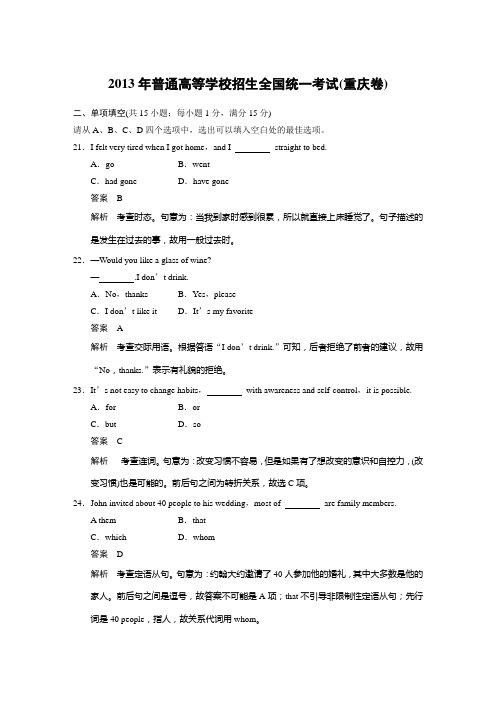
2013年普通高等学校招生全国统一考试(重庆卷)二、单项填空(共15小题;每小题1分,满分15分)请从A、B、C、D四个选项中,选出可以填入空白处的最佳选项。
21.I felt very tired when I got home,and I straight to bed.A.go B.wentC.had gone D.have gone答案 B解析考查时态。
句意为:当我到家时感到很累,所以就直接上床睡觉了。
句子描述的是发生在过去的事,故用一般过去时。
22.—Would you like a glass of wine?—.I don’t drink.A.No,thanks B.Yes,pleaseC.I don’t like it D.It’s my favorite答案 A解析考查交际用语。
根据答语“I don’t drink.”可知,后者拒绝了前者的建议,故用“No,thanks.”表示有礼貌的拒绝。
23.It’s not easy to change habits,with awareness and self-control,it is possible.A.for B.orC.but D.so答案 C解析考查连词。
句意为:改变习惯不容易,但是如果有了想改变的意识和自控力,(改变习惯)也是可能的。
前后句之间为转折关系,故选C项。
24.John invited about 40 people to his wedding,most of are family members.A them B.thatC.which D.whom答案 D解析考查定语从句。
句意为:约翰大约邀请了40人参加他的婚礼,其中大多数是他的家人。
前后句之间是逗号,故答案不可能是A项;that不引导非限制性定语从句;先行词是40 people,指人,故关系代词用whom。
25.we have enough evidence,we can’t win the case.A.Once B.As long asC.Unless D.Since答案 C解析考查状语从句。
2013年普通高等学校招生全国统一考试英语试题(重庆卷)word版2013年普通高等学校招生全国统一

绝密★启用前2013年普通高等学校招生全国统一考试(重庆卷)英语试题卷英语试题卷共15页。
满分150分。
考试时间120分钟。
注意事项:1.答题前,务必将自己的姓名、准考证号填写在答题卡规定的位置上。
2.答选择题时,必须使用2B铅笔将答题卡上对应题目的答案标号涂黑。
如需改动.用像皮擦擦干净后,再选涂其它答案标号。
3.答非选择题时,必须使用0.5毫米黑色签字笔,将答案书写在答题卡规定的位置上。
4.所有题目必须在答题卡上作答.在试题卷上答题无效。
5.考试结束后,将试题卷和答题卡一并交回。
一、听力(共三节.满分30分)做题时.请先将答案划在试题卷上。
录音内容结束后,你将有两分钟的时间将试题卷上的答案转涂或转填到答题卡上。
第一节(共5小题;每小越1.5分,满分7.5分)请听下面5段对话。
每段对话后有一个小题.从题中所给的A、B、C三个选项中选出最佳选项。
听完每段对话后,你都有10秒钟的时间来回答有关小题和阅读下一小题。
每段对话仅读一遍。
例:How much is the shirt?A.£19.15.B.£9.15.C. £9.18.答案是B。
1.How many sisters doesthe woman have?A. One.B . Twe.C. Three.2. What iswoman going to do tonight?A. Meet the man.B. Go out for dinner.C. Prepare for a meeting.3. Who has a dictionary?A.The man.B. Lucy.C. Tina.4. What are the two speakers most probably?A. Students.B.Workers.C.Teachers.5. What are the two speakers talking about?A.A language.B. An interest.C.A class.第二节(共12小题;每小题1.5分,满分18分)请听下面4段对话或独白。
普通高等学校招生全国统一考试(重庆卷)英语word版含答案精编版
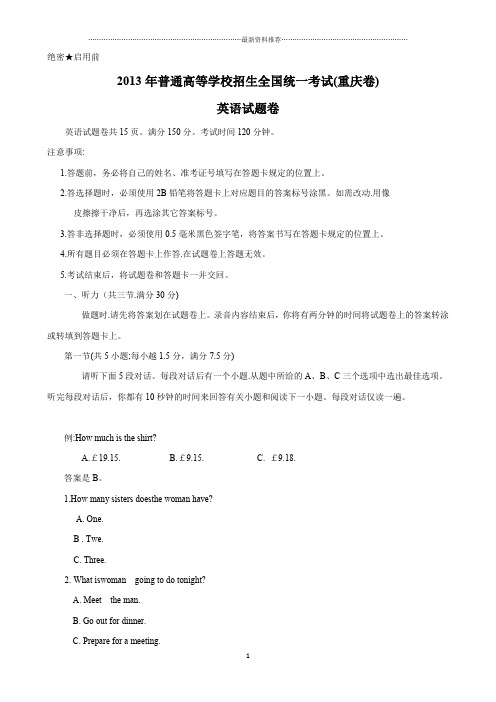
绝密★启用前2013年普通高等学校招生全国统一考试(重庆卷)英语试题卷英语试题卷共15页。
满分150分。
考试时间120分钟。
注意事项:1.答题前,务必将自己的姓名、准考证号填写在答题卡规定的位置上。
2.答选择题时,必须使用2B铅笔将答题卡上对应题目的答案标号涂黑。
如需改动.用像皮擦擦干净后,再选涂其它答案标号。
3.答非选择题时,必须使用0.5毫米黑色签字笔,将答案书写在答题卡规定的位置上。
4.所有题目必须在答题卡上作答.在试题卷上答题无效。
5.考试结束后,将试题卷和答题卡一并交回。
一、听力(共三节.满分30分)做题时.请先将答案划在试题卷上。
录音内容结束后,你将有两分钟的时间将试题卷上的答案转涂或转填到答题卡上。
第一节(共5小题;每小越1.5分,满分7.5分)请听下面5段对话。
每段对话后有一个小题.从题中所给的A、B、C三个选项中选出最佳选项。
听完每段对话后,你都有10秒钟的时间来回答有关小题和阅读下一小题。
每段对话仅读一遍。
例:How much is the shirt?A.£19.15.B.£9.15.C. £9.18.答案是B。
1.How many sisters doesthe woman have?A. One.B . Twe.C. Three.2. What iswoman going to do tonight?A. Meet the man.B. Go out for dinner.C. Prepare for a meeting.3. Who has a dictionary?A.The man.B. Lucy.C. Tina.4. What are the two speakers most probably?A. Students.B.Workers.C.Teachers.5. What are the two speakers talking about?A.A language.B. An interest.C.A class.第二节(共12小题;每小题1.5分,满分18分)请听下面4段对话或独白。
2013年重庆高考真题:英语试题
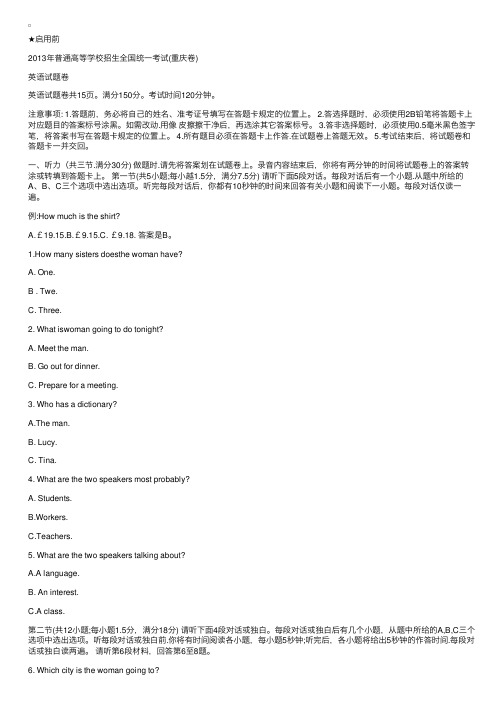
★启⽤前2013年普通⾼等学校招⽣全国统⼀考试(重庆卷)英语试题卷英语试题卷共15页。
满分150分。
考试时间120分钟。
注意事项: 1.答题前,务必将⾃⼰的姓名、准考证号填写在答题卡规定的位置上。
2.答选择题时,必须使⽤2B铅笔将答题卡上对应题⽬的答案标号涂⿊。
如需改动.⽤像⽪擦擦⼲净后,再选涂其它答案标号。
3.答⾮选择题时,必须使⽤0.5毫⽶⿊⾊签字笔,将答案书写在答题卡规定的位置上。
4.所有题⽬必须在答题卡上作答.在试题卷上答题⽆效。
5.考试结束后,将试题卷和答题卡⼀并交回。
⼀、听⼒(共三节.满分30分) 做题时.请先将答案划在试题卷上。
录⾳内容结束后,你将有两分钟的时间将试题卷上的答案转涂或转填到答题卡上。
第⼀节(共5⼩题;每⼩越1.5分,满分7.5分) 请听下⾯5段对话。
每段对话后有⼀个⼩题.从题中所给的A、B、C三个选项中选出选项。
听完每段对话后,你都有10秒钟的时间来回答有关⼩题和阅读下⼀⼩题。
每段对话仅读⼀遍。
例:How much is the shirt?A.£19.15.B.£9.15.C. £9.18. 答案是B。
1.How many sisters doesthe woman have?A. One.B . Twe.C. Three.2. What iswoman going to do tonight?A. Meet the man.B. Go out for dinner.C. Prepare for a meeting.3. Who has a dictionary?A.The man.B. Lucy.C. Tina.4. What are the two speakers most probably?A. Students.B.Workers.C.Teachers.5. What are the two speakers talking about?A.A language.B. An interest.C.A class.第⼆节(共12⼩题;每⼩题1.5分,满分18分) 请听下⾯4段对话或独⽩。
2013高考英语重庆卷(含详细答案)
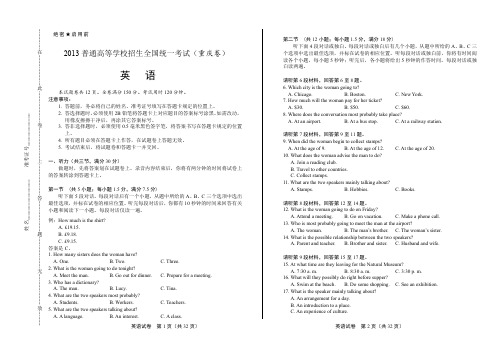
英语试卷 第1页(共32页)英语试卷 第2页(共32页)绝密★启用前2013普通高等学校招生全国统一考试(重庆卷)英语本试题卷共12页。
全卷满分150分。
考试用时120分钟。
注意事项:1. 答题前,务必将自己的姓名、准考证号填写在答题卡规定的位置上。
2. 答选择题时,必须使用2B 铅笔将答题卡上对应题目的答案标号涂黑。
如需改动,用橡皮擦擦干净后,再涂其它答案标号。
3. 答非选择题时,必须使用0.5毫米黑色签字笔,将答案书写在答题卡规定的位置上。
4. 所有题目必须在答题卡上作答,在试题卷上答题无效。
5. 考试结束后,将试题卷和答题卡一并交回。
一、听力(共三节,满分30分)做题时,先将答案划在试题卷上。
录音内容结束后,你将有两分钟的时间将试卷上的答案转涂到答题卡上。
第一节 (共5小题;每小题1.5分,满分7.5分)听下面5段对话。
每段对话后有一个小题,从题中所给的A 、B 、C 三个选项中选出最佳选项,并标在试卷的相应位置。
听完每段对话后,你都有10秒钟的时间来回答有关小题和阅读下一小题。
每段对话仅读一遍。
例:How much is the shirt?A. £19.15.B. £9.18.C. £9.15. 答案是C 。
1. How many sisters does the woman have? A. One. B. Two. C. Three.2. What is the woman going to do tonight? A. Meet the man. B. Go out for dinner. C. Prepare for a meeting.3. Who has a dictionary? A. The man. B. Lucy.C. Tina. 4. What are the two speakers most probably? A. Students. B. Workers. C. Teachers. 5. What are the two speakers talking about? A. A language. B. An interest.C. A class.第二节 (共12小题;每小题1.5分,满分18分)听下面4段对话或独白。
2013高考重庆英语

绝密★启用前2013年普通高等学校招生全国统一考试(重庆卷)英语试题卷英语试题卷共15页。
满分150分。
考试时间120分钟。
注意事项:1.答题前,务必将自己的姓名、准考证号填写在答题卡规定的位置上。
2.答选择题时,必须使用2B铅笔将答题卡上对应题目的答案标号涂黑。
如需改动.用像皮擦擦干净后,再选涂其它答案标号。
3.答非选择题时,必须使用0.5毫米黑色签字笔,将答案书写在答题卡规定的位置上。
4.所有题目必须在答题卡上作答.在试题卷上答题无效。
5.考试结束后,将试题卷和答题卡一并交回。
一、听力(共三节.满分30分)做题时.请先将答案划在试题卷上。
录音内容结束后,你将有两分钟的时间将试题卷上的答案转涂或转填到答题卡上。
第一节(共5小题;每小越1.5分,满分7.5分)请听下面5段对话。
每段对话后有一个小题.从题中所给的A、B、C三个选项中选出最佳选项。
听完每段对话后,你都有10秒钟的时间来回答有关小题和阅读下一小题。
每段对话仅读一遍。
例:How much is the shirt?A.£19.15.B.£9.15.C. £9.18.答案是B。
1.How many sisters doesthe woman have?A. One.B . Twe.C. Three.2. What iswoman going to do tonight?A. Meet the man.B. Go out for dinner.C. Prepare for a meeting.3. Who has a dictionary?A.The man.B. Lucy.C. Tina.4. What are the two speakers most probably?A. Students.B.Workers.C.Teachers.5. What are the two speakers talking about?A.A language.B. An interest.C.A class.第二节(共12小题;每小题1.5分,满分18分)请听下面4段对话或独白。
(NEW)2013年重庆市高考英语试卷及答案详解(全国统一考试)网页版
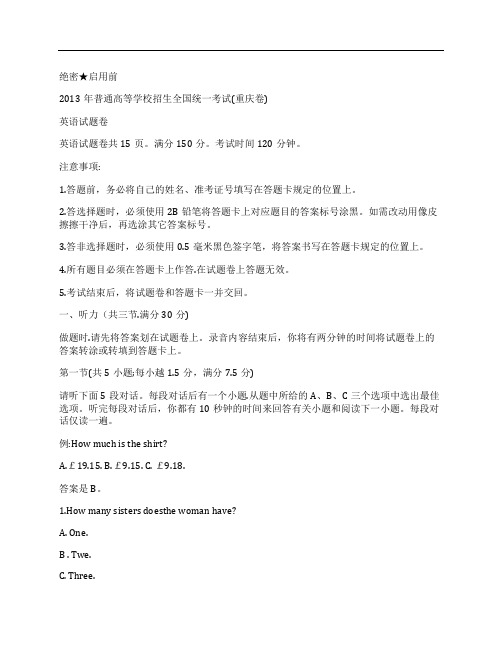
绝密★启用前2013年普通高等学校招生全国统一考试(重庆卷)英语试题卷英语试题卷共15页。
满分150分。
考试时间120分钟。
注意事项:1.答题前,务必将自己的姓名、准考证号填写在答题卡规定的位置上。
2.答选择题时,必须使用2B铅笔将答题卡上对应题目的答案标号涂黑。
如需改动用像皮擦擦干净后,再选涂其它答案标号。
3.答非选择题时,必须使用0.5毫米黑色签字笔,将答案书写在答题卡规定的位置上。
4.所有题目必须在答题卡上作答.在试题卷上答题无效。
5.考试结束后,将试题卷和答题卡一并交回。
一、听力(共三节.满分30分)做题时.请先将答案划在试题卷上。
录音内容结束后,你将有两分钟的时间将试题卷上的答案转涂或转填到答题卡上。
第一节(共5小题;每小越1.5分,满分7.5分)请听下面5段对话。
每段对话后有一个小题.从题中所给的A、B、C三个选项中选出最佳选项。
听完每段对话后,你都有10秒钟的时间来回答有关小题和阅读下一小题。
每段对话仅读一遍。
例:How much is the shirt?A.£19.15.B.£9.15.C. £9.18.答案是B。
1.How many sisters doesthe woman have?A. One.B . Twe.C. Three.2. What iswoman going to do tonight?A. Meet the man.B. Go out for dinner.C. Prepare for a meeting.3. Who has a dictionary?A.The man.B. Lucy.C. Tina.4. What are the two speakers most probably?A. Students.B.Workers.C.Teachers.5. What are the two speakers talking about?A.A language.B. An interest.C.A class.第二节(共12小题;每小题1.5分,满分18分)请听下面4段对话或独白。
2013年普通高等学校招生全国统一考试(重庆卷)英语试题卷
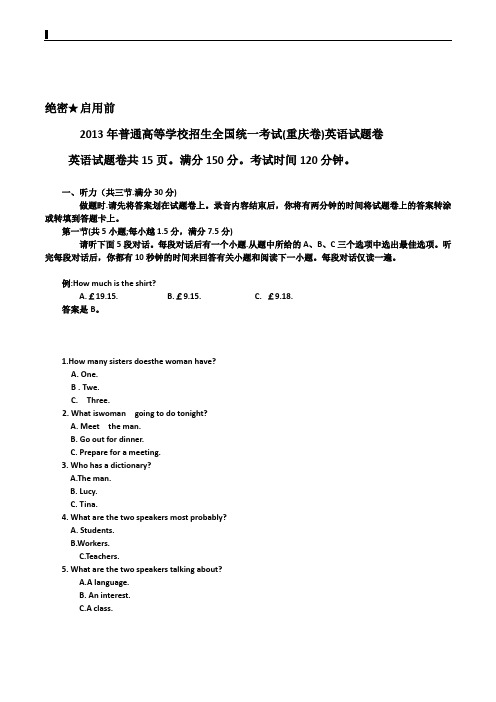
绝密★启用前2013年普通高等学校招生全国统一考试(重庆卷)英语试题卷英语试题卷共15页。
满分150分。
考试时间120分钟。
一、听力(共三节.满分30分)做题时.请先将答案划在试题卷上。
录音内容结束后,你将有两分钟的时间将试题卷上的答案转涂或转填到答题卡上。
第一节(共5小题;每小越1.5分,满分7.5分)请听下面5段对话。
每段对话后有一个小题.从题中所给的A、B、C三个选项中选出最佳选项。
听完每段对话后,你都有10秒钟的时间来回答有关小题和阅读下一小题。
每段对话仅读一遍。
例:How much is the shirt?A.£19.15.B.£9.15.C. £9.18.答案是B。
1.How many sisters doesthe woman have?A. One.B . Twe.C. Three.2. What iswoman going to do tonight?A. Meet the man.B. Go out for dinner.C. Prepare for a meeting.3. Who has a dictionary?A.The man.B. Lucy.C. Tina.4. What are the two speakers most probably?A. Students.B.Workers.C.Teachers.5. What are the two speakers talking about?A.A language.B. An interest.C.A class.第二节(共12小题;每小题1.5分,满分18分)请听下面4段对话或独白。
每段对话或独白后有几个小题,从题中所给的A,B,C三个选项中选出最佳选项。
听每段对话或独白前.你将有时间阅读各小题,每小题5秒钟;听完后,各小题将给出5秒钟的作答时间.每段对话或独白读两遍。
请听第6段材料,回答第6至8题。
6. Which city is the woman going to?A. Chicago.B. Boston.C. New York.7. How much will the woman pay for her ticket?A. $30.B. $50.C. $60.8. Where does the conversation most probably take place?A. At an airport.B. At a bus stop.C. At a railway station.请听第7段材料,回答第9至11题。
2013高考英语重庆卷-答案
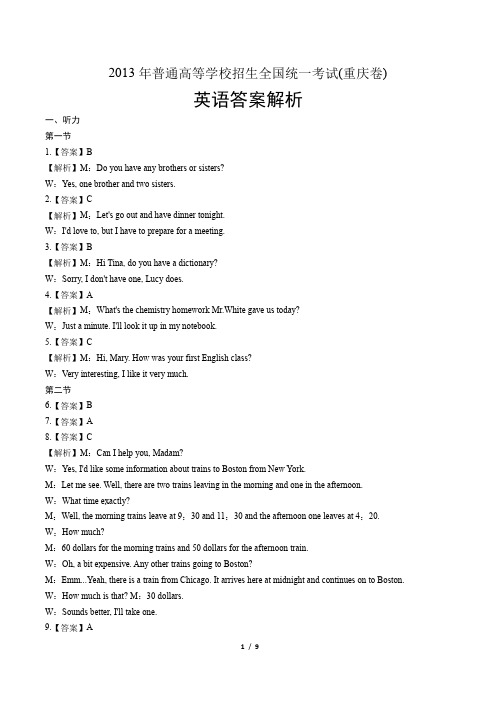
2013年普通高等学校招生全国统一考试(重庆卷)英语答案解析一、听力第一节1.【答案】B【解析】M:Do you have any brothers or sisters?W:Yes, one brother and two sisters.2.【答案】C【解析】M:Let's go out and have dinner tonight.W:I'd love to, but I have to prepare for a meeting.3.【答案】B【解析】M:Hi Tina, do you have a dictionary?W:Sorry, I don't have one, Lucy does.4.【答案】A【解析】M:What's the chemistry homework Mr.White gave us today?W:Just a minute. I'll look it up in my notebook.5.【答案】C【解析】M:Hi, Mary. How was your first English class?W:V ery interesting, I like it very much.第二节6.【答案】B7.【答案】A8.【答案】C【解析】M:Can I help you, Madam?W:Yes, I'd like some information about trains to Boston from New York.M:Let me see. Well, there are two trains leaving in the morning and one in the afternoon.W:What time exactly?M:Well, the morning trains leave at 9:30 and 11:30 and the afternoon one leaves at 4:20.W:How much?M:60 dollars for the morning trains and 50 dollars for the afternoon train.W:Oh, a bit expensive. Any other trains going to Boston?M:Emm...Yeah, there is a train from Chicago. It arrives here at midnight and continues on to Boston. W:How much is that? M:30 dollars.W:Sounds better, I'll take one.9.【答案】A10.【答案】A11.【答案】B【解析】W:Frank, have you got any hobby?M:Well, I don't think I have one. How about you?W:I have several hobbies, reading, gardening...but collecting stamps is the one I like best. M:Interesting, how long have you been collecting stamps?W:12 years so far, since I was 9.M:You must have a lot of stamps then.W:Sure, I have thousands of stamps from more than 20 countries.M:Wow, unbelievable! I also want to have a hobby, but I just don't have the time.W:What keeps you so busy?M:I travel a lot on business.W:Then how do you kill time on your trips?M:Sometimes I read a book.W:I have an idea. You can join a reading club.M:Reading club? What do you do there?W:We read books and organize discussions.M:Sounds great! I am in.12.【答案】A13.【答案】C14.【答案】C【解析】W:Hi, John.M:Hi, honey. Good news! All my work here will be finished by Thursday.W:Oh, that's wonderful. I miss you so much.M:Me too. I'll get home on Friday.W:I just can't wait to see you. And the kids will be very excited. What time exactly?M:3:50 in the afternoon. Can you come and meet me at the airport?W:Oh, it's too bad. I'll be in the parent teacher meeting at that time.M:Don't worry. Let me call my brother Jim and see if he'll be free.W:You don't have to. My sister Helen is here on vacation and she can pick you up.M:That will be fine.W:I'll be home around 5. And we can have a big family dinner together.M:Fantastic! See you Friday then. W:See you and have a nice trip.15.【答案】B16.【答案】B17.【答案】A【解析】May I have your attention please? Here is our plan for tomorrow. We'll have breakfast at 7:30 in the hotel. After that, we'll set out for the Natural Museum at 8:30. There, you can see a great exhibition of Dinosaurs. After lunch at a famous French restaurant, we'll drive to the beach where you can swim or simply work around. I'm sure you'll be impressed by the beautiful scenery. At about 3:30, we'll visit the Central Square, the oldest part of the city. The Square was built in 1815 with a history of about 200 years. It'll be a great place for you to experience the local culture. At the same time, you can do some shopping. We'll have supper in a Chinese restaurant and return to the hotel afterwards. Wish you all a great time tomorrow.18.【答案】37/ thirty-seven/ Thirty-seven19.【答案】geography / Geography20.【答案】driver/ Driver/ taxi-driver/Taxi-driver【解析】Good evening, ladies and gentlemen. Welcome to tonight's top Prin. As usual, we've got 3 guests. Each of them has to answer 12 questions in order to win the huge prize. Our first guest is Peter Smith. He is 37 years old and works as a computer engineer. He is especially fond of art and literature. Tom Anderson, our second guest, is a salesman in an international trade company. He is 28 and has been to 23 countries. This makes him confident in geography and history. Our last guest, Jack Brown, is a 36 years old taxi driver. As a driver, he has met people from all over the world. He can speak 5 languages and has a good knowledge of many different cultures. Can this help him stand out? OK, let's begin with our first guest Peter Smith.二、单项填空21.【答案】B【解析】句意:到家的时候我感到非常累,就直接上床睡觉了。
2013年普通高等学校招生全国统一考试重庆卷英语
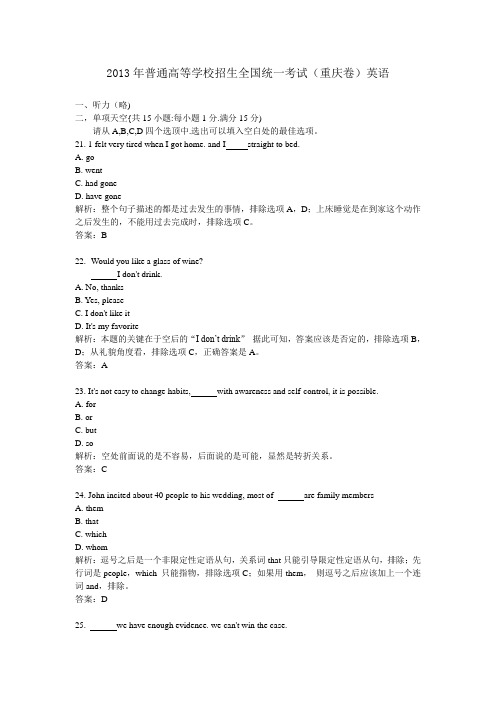
2013年普通高等学校招生全国统一考试(重庆卷)英语一、听力(略)二,单项天空{共15小题:每小题1分.满分15分)请从A,B,C,D四个选顶中.选出可以填入空白处的最佳选项。
21. 1 felt very tired when I got home. and I straight to bed.A. goB. wentC. had goneD. have gone解析:整个句子描述的都是过去发生的事情,排除选项A,D;上床睡觉是在到家这个动作之后发生的,不能用过去完成时,排除选项C。
答案:B22. -Would you like a glass of wine?- I don't drink.A. No, thanksB. Yes, pleaseC. I don't like itD. It's my favorite解析:本题的关键在于空后的“I don’t drink”据此可知,答案应该是否定的,排除选项B,D;从礼貌角度看,排除选项C,正确答案是A。
答案:A23. It's not easy to change habits, with awareness and self-control, it is possible.A. forB. orC. butD. so解析:空处前面说的是不容易,后面说的是可能,显然是转折关系。
答案:C24. John incited about 40 people to his wedding, most of are family membersA. themB. thatC. whichD. whom解析:逗号之后是一个非限定性定语从句,关系词that只能引导限定性定语从句,排除;先行词是people,which 只能指物,排除选项C;如果用them,则逗号之后应该加上一个连词and,排除。
答案:D25. we have enough evidence. we can't win the case.A, OnceB. As long asC. UnlessD. Since解析:“我们有足够的证据”和“我们不能赢得这个案子”之间的关系有可能是两种:(1)让步关系;(2)否定前面的意思。
高中英语真题-2013年普通高等学校全国统一考试(重庆卷)_10

高中英语真题:2013年普通高等学校全国统一考试(重庆卷)一、听力(共三节,满分30分)做题时,先将答案划在试题卷上。
录音内容结束后,你将有两分钟的时间将试题卷上的答案转涂或转填到答题卡上。
第一节(共5小题;每小题1.5分,满分7.5分)请听下面5段对话。
每段对话后有一个小题,从题中所给的A、B、C三个选项中选出最佳选项,并标在试题卷的相应位置。
听完每段对话后,你都有10秒钟的时间来回答有关小题和阅读下一小题。
每段对话仅读一遍。
例:How much is the shirt?A.£19.15.B.£9.15.C.£9.18.答案选B.1. How does the woman keep slim?A.By going on a diet.B.By eating fruit and vegetables.C.By doing physical exercise.2. What does the woman mean?A.The man didn’t practice hard enough.B.The man should find a new partner.C.The man should not give up.3. What does Marilyn probably want to be? A.Accountant. B.Artist.C.Scientist.4. How much does one ticket cost?A.$8. B.$4.C.$6.5. What are the speakers talking about?A.A rent increase. B.A bargain.C.A salary cut.第二节(共12小题;每小题1.5分,满分18分)请听下面4段对话。
每段对话后有几个小题,从题中所给的A、B、C三个选项中选出最佳选项,并标在试题卷的相应位置。
重庆市2013年英语高考题
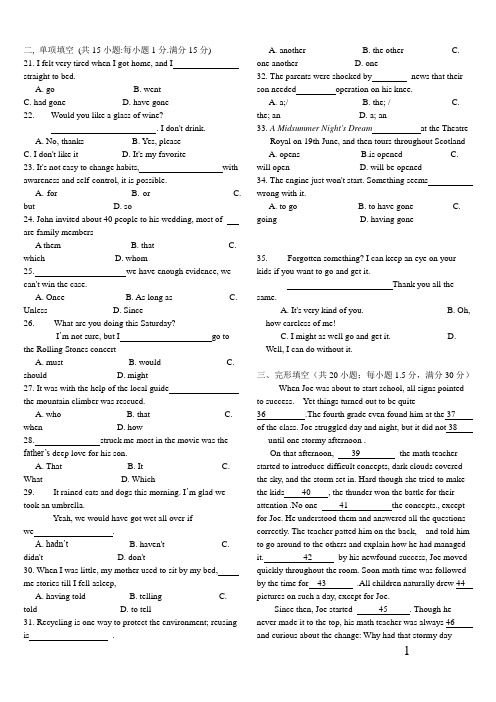
二, 单项填空(共15小题:每小题1分.满分15分)21. I felt very tired when I got home, and Istraight to bed.A. goB. wentC. had goneD. have gone22. -----Would you like a glass of wine?----- . I don't drink.A. No, thanksB. Yes, pleaseC. I don't like itD. It's my favorite23. It's not easy to change habits, with awareness and self-control, it is possible.A. forB. orC. butD. so24. John invited about 40 people to his wedding, most ofare family membersA them B. that C. which D. whom25. we have enough evidence, we can't win the case.A. OnceB. As long asC. UnlessD. Since26. ------What are you doing this Saturday?------ I’m not sure, but I go to the Rolling Stones concertA. mustB. wouldC. shouldD. might27. It was with the help of the local guidethe mountain climber was rescued.A. whoB. thatC. whenD. how28. struck me most in the movie was the father’s deep love for his son.A. ThatB. ItC. WhatD. Which29. ----- It rained cats and dogs this morning. I’m glad we took an umbrella.----- Yeah, we would have got wet all over ifwe .A. hadn’tB. haven'tC. didn'tD. don't30. When I was little, my mother used to sit by my bed,me stories till I fell asleep,A. having toldB. tellingC. toldD. to tell31. Recycling is one way to protect the environment; reusing is .A. anotherB. the otherC. one anotherD. one32. The parents were shocked by news that their son needed operation on his knee.A. a;/B. the; /C. the; anD. a; an33. A Midsummer Night's Dream at the TheatreRoyal on 19th June, and then tours throughout ScotlandA. opensB.is openedC. will openD. will be opened34. The engine just won't start. Something seemswrong with it.A. to goB. to have goneC. goingD. having gone35.------ Forgotten something? I can keep an eye on your kids if you want to go and get it.------ Thank you all the same.A. It's very kind of you.B. Oh, how careless of me!C. I might as well go and get it.D. Well, I can do without it.三、完形填空(共20小题;每小题1.5分,满分30分)When Joe was about to start school, all signs pointed to success. Yet things turned out to be quite36 .The fourth grade even found him at the 37of the class. Joe struggled day and night, but it did not 38----until one stormy afternoon .On that afternoon, 39 the math teacher started to introduce difficult concepts, dark clouds covered the sky, and the storm set in. Hard though she tried to make the kids 40 , the thunder won the battle for their attention .No one 41 the concepts., except for Joe. He understood them and answered all the questions correctly. The teacher patted him on the back, and told him to go around to the others and explain how he had managed it. 42 by his newfound success, Joe moved quickly throughout the room. Soon math time was followed by the time for 43 .All children naturally drew 44 pictures on such a day, except for Joe.Since then, Joe started 45 . Though he never made it to the top, his math teacher was always 46 and curious about the change: Why had that stormy daychanged Joe?On the day Joe graduated, he presented the teacher with his most 47 possession—the picture of a bright yellow sun. On the picture Joe had written: This is the day I 48 my brightness.36.A.unfair B. boringC. disappointingD. dangerous37.A.center B. topC. beginningD. bottom38.A.happen B. workC. finishD. last39.A .until B. sinceC. becauseD. as40.A .concentrate B. changeC. hideD. sit41.A.challenged B. graspedC. doubtedD. admitted42.A.Relieved B. SurprisedC. EncouragedD. Puzzled43.A. class B. sportsC. artD. tea44.A .great B. darkC. differentD. strange45.A .improving B. paintingC. recoveringD. studying46.A. worried B. amazedC. friendlyD. cautious47.A .familiar B. expensiveC. admirableD. precious48.A.woke up to B. put up withC. got on withD. looked down uponBIt is easy to overlook the role that your body plays in influencing your mood(情绪). When you are 49 ,you may find yourself blaming work pressures or an unknown future. However, it could just be that you’ve been sitting behind your desk too long.One way to improve your mood is 50 . Psychologically, it provides you with a break from the stresses in your life .Also, in the process, you may aim for 51 goals, like a mew personal running record or a better body shape. The achievement of a particular goal makes you feel good and contributes to your 52 .That is why exercise has been shown to 53 your self-respect.You do not have to train yourself 54 to feel the psychological benefits of exercise. What really matters is 55 ,not intensity(强度)of your exercise. You can try walking for 30 minutes five times per week or simply gardening on weekends.49.A.ill B. poorC. unhappyD. unsuccessful50.A.play B. communicationC. sleepD. exercise51.A.clear B. presentC. commonD. early52.A.ability B. relationshipC. confidenceD. business53.A.tear down B. build upC. set asideD. give out54.A.hard B. everywhereC. carefullyD. late55.A.time B. lengthC. formD. frequency四、阅读理解(共20小题;每小题2分,满分40分)请阅读下列短文,从每题所给的四个选项(A、B、C和D)中,选出最佳选项,并在答题卡上将该选项的标号涂黑。
(NEW)2013年重庆市高考英语试卷及答案详解(全国统一考试)网页版
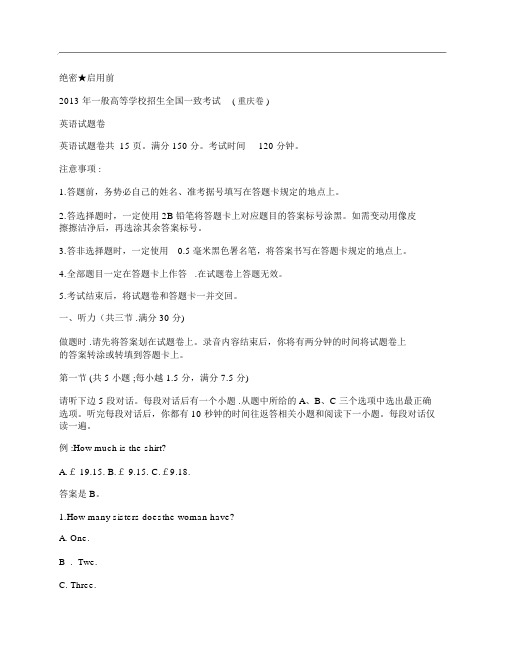
绝密★启用前2013 年一般高等学校招生全国一致考试( 重庆卷 )英语试题卷英语试题卷共 15 页。
满分 150 分。
考试时间120 分钟。
注意事项 :1.答题前,务势必自己的姓名、准考据号填写在答题卡规定的地点上。
2.答选择题时,一定使用 2B 铅笔将答题卡上对应题目的答案标号涂黑。
如需变动用像皮擦擦洁净后,再选涂其余答案标号。
3.答非选择题时,一定使用0.5 毫米黑色署名笔,将答案书写在答题卡规定的地点上。
4.全部题目一定在答题卡上作答.在试题卷上答题无效。
5.考试结束后,将试题卷和答题卡一并交回。
一、听力(共三节 .满分 30 分)做题时 .请先将答案划在试题卷上。
录音内容结束后,你将有两分钟的时间将试题卷上的答案转涂或转填到答题卡上。
第一节 (共 5 小题 ;每小越 1.5 分,满分 7.5 分)请听下边 5 段对话。
每段对话后有一个小题 .从题中所给的 A、B、C 三个选项中选出最正确选项。
听完每段对话后,你都有 10 秒钟的时间往返答相关小题和阅读下一小题。
每段对话仅读一遍。
例 :How much is the shirt?A.£ 19.15.B.£ 9.15.C.£9.18.答案是 B。
1.How many sisters doesthe woman have?A.One.B . Twe.C. Three.2.What iswoman going to do tonight?A. Meet the man.B. Go out for dinner.C. Prepare for a meeting.3.Who has a dictionary?A.The man.B.Lucy.C.Tina.4.What are the two speakers most probably?A. Students.B.Workers.C.Teachers.5.What are the two speakers talking about?A.A language.B. An interest.C.A class.第二节 (共 12 小题 ;每题 1.5 分,满分 18 分)请听下边4 段对话或独白。
2013高考英语真题重庆卷及答案-(7666)

2013 高考英语真题重庆卷一、听力(共三节,满分30分)第一节(共 5 小题;每小题 1.5 分,满分7.5 分)请听下面 5 段对话。
每段对话后有一个小题,从题中所给的 A 、B、C 三个选项中选出最佳选项。
听完每段对话后,你都有10 秒钟的时间来回答有关小题和阅读下一小题。
每段对话读一遍。
例:How much is the shirt?A. £19.15B. £9.15C. £9.18答案是B。
1. How many sisiters does the woman have?A. One.B. Two.C. Three.2. What is the woman going to do tonight?A. Meet the man.B. Go out for dinner.C. Prepare for a meeting.3. Who has a dictionary?A. The man.B. Lucy.C. Tina.4. What are the two speakers most probably?A. Students.B. Workers.C. Teachers.5. What are the two speakers talking about?A. A language.B. An interest.C. A class.第二节(共12 小题;每小题 1.5 分,满分18 分)请听下面 4 端对话或独白。
每段对话或独白后有几个小题,从题所给的A、B、C 三个选项中选出最佳选项。
听每段对话或独白前,你将有时间阅读各小题,每小题 5 秒钟;听完后,各小题将给出 5 秒钟的作答时间。
每段对话或独白读两遍。
请听第 6 段材料,回答第 6 至第8 题。
6. Which city is the woman going to?A. Chicago.B. Boston.C. New York.7. How much will teh woman pay for her ticket?A. $30.B. $50.C. $60.8. Where does the converstation most probably take place?A. At an airport.B. At a bus stop.C. At a railway station.请听第7 段材料,回答第9 至11 题。
重庆市2013年高考试卷(英语)
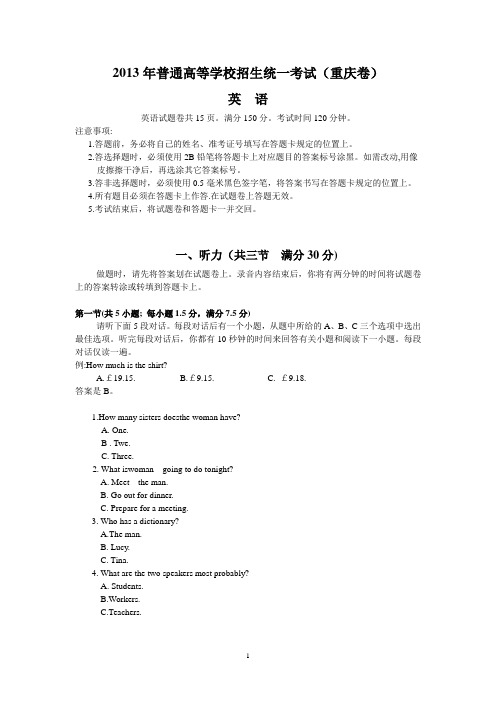
2013年普通高等学校招生统一考试(重庆卷)英语英语试题卷共15页。
满分150分。
考试时间120分钟。
注意事项:1.答题前,务必将自己的姓名、准考证号填写在答题卡规定的位置上。
2.答选择题时,必须使用2B铅笔将答题卡上对应题目的答案标号涂黑。
如需改动,用像皮擦擦干净后,再选涂其它答案标号。
3.答非选择题时,必须使用0.5毫米黑色签字笔,将答案书写在答题卡规定的位置上。
4.所有题目必须在答题卡上作答.在试题卷上答题无效。
5.考试结束后,将试题卷和答题卡一并交回。
一、听力(共三节满分30分)做题时,请先将答案划在试题卷上。
录音内容结束后,你将有两分钟的时间将试题卷上的答案转涂或转填到答题卡上。
第一节(共5小题; 每小题1.5分,满分7.5分)请听下面5段对话。
每段对话后有一个小题,从题中所给的A、B、C三个选项中选出最佳选项。
听完每段对话后,你都有10秒钟的时间来回答有关小题和阅读下一小题。
每段对话仅读一遍。
例:How much is the shirt?A.£19.15.B.£9.15.C. £9.18.答案是B。
1.How many sisters doesthe woman have?A. One.B . Twe.C. Three.2. What iswoman going to do tonight?A. Meet the man.B. Go out for dinner.C. Prepare for a meeting.3. Who has a dictionary?A.The man.B. Lucy.C. Tina.4. What are the two speakers most probably?A. Students.B.Workers.C.Teachers.5. What are the two speakers talking about?A.A language.B. An interest.C.A class.第二节(共12小题;每小题1.5分,满分18分)请听下面4段对话或独白。
2013年高考英语试题单项选择解析重庆卷

2013年高考英语试题单项选择解析重庆卷解析】考查定语从句。
先行词为people,关系词在从句中作主语,指人,应用whom。
句意:___邀请了大约40人参加他的婚礼,其中大多数是家庭成员。
语言研究】family members家庭成员。
改写】___ 40 individuals to his wedding。
most of whom were family members.2013重庆25】The book tells us how to make full use of our time and how to avoid_______time.A。
___ wasted答案】B解析】考查动词-ing形式作宾语。
avoid后接动词-ing形式作宾语,表示避免做某事。
句意:这本书告诉我们如何充分利用时间,避免浪费时间。
语言研究】make full use of充分利用。
改写】___ it.2013重庆26】—I'm sorry。
I didn't mean to break it._______。
but you should be more ___.A。
Never mindB。
No problemC。
That's all rightD。
Not at all答案】C解析】考查交际用语。
That's all right没关系。
表示原谅对方的道歉。
句意:—对不起,我不是故意打破它的。
—没关系,但下次你应该更小心。
改写】- I apologize for breaking it.It's all right。
but please be more us in the future.2013重庆27】The boy is too young to_______such a difficult problem.A。
work outB。
work onC。
work upD。
work for答案】A解析】考查动词短语辨析。
- 1、下载文档前请自行甄别文档内容的完整性,平台不提供额外的编辑、内容补充、找答案等附加服务。
- 2、"仅部分预览"的文档,不可在线预览部分如存在完整性等问题,可反馈申请退款(可完整预览的文档不适用该条件!)。
- 3、如文档侵犯您的权益,请联系客服反馈,我们会尽快为您处理(人工客服工作时间:9:00-18:30)。
2013年普通高等学校招生全国统一考试(重庆卷)英语试题21. I felt very tired when I got home, and I _____ straight to bed.A. goB. wentC. had goneD. have gone22. —Would you like a glass of wine?—_____. I don’t drink.A. No, thanksB. Yes, pleaseC. I don’t like itD. It’s my favorite23. It’s not easy to change habits, _____ with awareness and self-control, it is possible.A. forB. orC. butD. so24. John invited about 40 people to his wedding, most of _____ are family members.A. themB. thatC. whichD. whom25. _____ we have enough evidence, we can’t win the case.A. OnceB. As long asC. UnlessD. Since26. —What are you doing this Saturday?—I’m not sure, but I _____ go to the Rolling Stones concert.A. MustB. wouldC. shouldD. might27. It was with the help of teh local guide _____ the mountain climber was rescued.A. whoB. thatC. whenD. how28. _____ struck me most in the movie was the father’s deep love for his son.A. ThatB. ItC. WhatD. Which29. —It rained cats and dogs this morning. I’m glad we took an umbrella.—Yeah, we would have got wet all over if we _____.A. hadn’tB. haven’tC. didn’tD. don’t30. When I was little, my mother used to sit by my bed, _____ me stories tillI fell asleep.A. having toldB. tellingC. toldD. to tell31. Recycling is one way to protect the environment; reusing is _____.A. anotherB. the otherC. one anotherD. one32. The parents were shocked by _____ news that their son needed _____ operation on his knee.A. a; /B. the; /C. the; anD. a; an33. A Midsummer Night’s Dream_____ at the Theatre Royal on 19th June,and then tours throughout Scotland.A. opensB. is openedC. will openD. will be opened34. The engine just won’t start. Something seems _____ wrong with it.A. to goB. to have goneC. goingD. having gone35. —Forgotten something? I can keep an eye on your kids if you want to go and get it.—_____ Thank you all the same.A. It’s very kind of you.B. Oh, how careless of me!C. I might as well go and get it.D. Well, I can do without it.三、完形填空(共20小题;每小题1.5分,满分30分)AWhen Joe was about to start school, all signs pointed to success. Yet things turned out to be quite 36 , The fourth grade even found him at the 37 of the class. Joe struggled day and night, but it did not 38 —until one stormy afternoon.On that afternoon, 39 the math teacher started to introduce difficult concepts, dark clouds covered the sky, and the storm set in. Hard though she tried to make the kids 40 , the thunder won the battle for their attention. No one 41 the concepts. Except for Joe. He understood them and answered all the questions correctly. The teacher patted him on the back, and told him to to around to the others and explain how he had managed it. 42 by his newfound success, Joe moved quickly thoughout the room. Soon math time was followed by the time for 43 . All children naturally drew 44 pictures on such a day. Except for Joe.Since then, Joe started 45 . Though he never made it to the top, his math teacher was always 46 and curious about the change: Why had that stormy day changed Joe?On the day Joe graduated, he presented the teacher with his most 47 possession—the picture of a bright yellow sun. On the picture Joe had written: This is the day I 48 my brightness.36. A. unfair B. boring C. disappointing D. dangerous37. A. center B. top C. beginning D. bottom38. A. happen B. work C. finish D. last39. A. until B. since C. because D. as40. A. concentrate B. change C. hide D. sit41. A. challenged B. grasped C. doubted D. admitted42. A. Relieved B. Surprised C. Encouraged D. Puzzled43. A. class B. sports C. art D. tea44. A. great B. dark C. different D. strange45. A. improving B. painting C. recovering D. studying46. A. worried B. amazed C. friendly D. cautious47. A. familiar B. expensive C. admirable D. precious48. A. woke up to B. put up with C. got on with D. looked down uponBIt is easy to overlook the role that your body plays in influencing your mood (情绪). When you are 49 , you may find yourself blaming work pressures or an unknown future. However, it could just be that you’ve been sitting behind your desk too long.One way to improve your mood is 50 . Psychologically, it provides you with a break from the stresses in your life. Also, in the process, you may aim for 51 goals, like a new personal running record or a better body shape. The achievement of a particular goal makes you feel good and contributes to your 52 . That is why exercise has been shown to 53 your self-respect.You do not have to train yourself 54 to feel the psychological benefits of exercise. What really matters is 55 , not intensity (强度) of your exercise. You can try walking for 30 minutes five times per week or simply gardening on weekends.49. A. ill B. poor C. unhappy D. unsuccessful50. A. play B. communication C. sleep D. exercise51. A. clear B. present C. common D. early52. A. ability B. relationship C. confidence D. business53. A. tear down B. build up C. set aside D. give out54. A. hard B. everywhere C. carefully D. late55. A. time B. length C. form D. frequency四、阅读理解(共20小题;每小题2分,满分40分)AThe morning had been a disaster. My tooth was aching, and I’d been in an argument with a friend. Her words still hurt: “The trouble with you is that you won’t put yourself in my place. Can’t you see things from my point ofview?” I shook my head stubbornly—and felt the ache in my tooth. I’d thought I could hold out till my dentist came back from holiday, but the pain was really unbearable. I started calling the dentists in the phone book, but no one could see me immediately. Finally, at about lunchtime, I got lucky.“If you come by right now,” the receptionist said, “the dentist will fit you in.”I took my purse and keys and rushed to my car. But suddenly I began to doubt about the dentist. What kind of dentist would be so eager to treat someone at such short notice? Why wasn’t he as busy as the others?In the dentist’s office, I sat down and looked around. I saw nothing but the bare walls and I became even more worried. The assistant noticed my nervousness and placed her warm hand over my ice-cold one.When I told my fears, she laughed and said, ‘Don’t worry. The dentist is very good.”“How long do I have to wait for him?” I asked impatiently.“Come on, he is coming. Just lie down and relax. And enjoy the artwork,” the assistant said.“The artwork?” I was puzzled.The chair went back. Suddenly I smiled. There was a beautiful picture, right where I could enjoy it: on the ceiling. How considerate the dentist was! At that moment, I began to udnerstand what my friend meant by her words.What a relief!56. Which of the following best describes the author’s feeling that morning?A. Cheerful.B. Nervous.C. Satisfied.D. Upset.57. What made the author begin to doubt about the dentist?A. The dentist’s agreeing to treat her at very short notice.B. The dentist’s being as busy as the other dentists.C. The surroundings of the dentist’s office.D. The laughing assistant of the dentist.58. Why did the author suddenly smile?A. Because the dentist came at last.B. Because she saw a picture on the ceiling.C. Because she could relax in the chair.D. Because the assistant kept comforting her.59. What did the author learn from her experience most probably?A. Strike while the iron is hot.B. Have a good word for one’sfriend.C. Put oneself in other’s shoes.D. A friend in need is a friend indeed.BOne of the greatest gifts one generation can give to other generations is the wisdom it has gained from experience. This idea has inspired the award-winning photographer Andrew Zuckerman. He interviewed and took photos of fifty over-sixty-five-year-olds all over the world. His project explores various aspects of their lives. The photos and interviews are now available on our website.Click on the introductions to read the complete interviews.Let us now have a culture of peace.—Federico Mayor Zaragoza, SpainFederico Mayor Zaragoza obtained a doctorate in pharmacy (药学) from the Complutense University of Madrid in 1958. After many years spent in politics, he became Director-General of UNESCO in 1987. In 1999, he created the Foundation for a Culture of Peace, of which he is now the president. In addition to many scientific publications, he has published four collections of poems and several books of essays.Writing is a discovery.—Nadine Gordimer, South AfricaDue to a weak heart, Nadine Gordimer attended school and universitybriefly. She read widely and began writing at an early age. She published her first short story at the age of fifteen, and has completed a large number of works, which ahve been translated into forty languages. In 1991, Gornimer won the Nobel Prize for Literature.Jazz is about the old form of art today.—Dave Brubeck, USADave Brubeck studied music at the University of the Pacific and graduated in 1942. After World War Two he was encouraged to play jazz. In 1951, he recorded his first album (专辑). Brubeck’s 1959 album has become a jazz standard. He received a Grammy Lifetime Achievement Award in 1996.For more figures CLICK HERE60. Why did Andrew Zuckerman choose the fifty elders for his project?A. Because their wisdom deserves to be passed on.B. Because they are physically impressive.C. Because their accomplishments inspired himD. Because they have similar experiences.61. According to the web pate, Federico Mayor Zaragoza _____.A. has won many awards for his work in politicsB. has served as the president of a universityC. has devoted all his life to the field of scienceD. has made achievements in different areas62. Who most probably said “My education has been the library and books” inthe interview when reflecting on his/her experience?A. Andrew Zuckerman.B. Federico Mayor Zaragoza.C. Nadine Gordimer.D. Dave Brubeck.63. What is the main purpose of this web page?A. To show Zuckerman’s awards.B. To publicize Zuckerman’s project.C. To spread the wisdom of the three people.D. To celebrate the achievements of the three people.CAlmost every machine with moving parts has wheels, yet no one knows exactly when the first wheel was invented or what it was used for. We do know, however, that they existed over 5,500 years ago in ancient Asia.The oldest known transport wheel was discovered in 2002 in Slovenia. It is over 5,100 years old. Evidence suggests that wheels for transport didn’t become popular for a while, though. This could be because animals did a perfectly good job of carrying farming tools and humans around.But it could also be because of a difficult situation. While wheels need to roll on smooth surface, roads with smooth surfaces weren’t going to be constructed until there was plenty of demand for them. Eventually, road surfaces did become smoother, but this difficult situation appeared again a few centuries later. There had been no important changes in wheel and vehicle design before the arrival of modern road design.In the mid-1700s, a Frenchman came up with a new design of road—a base layer (层) of large stones covered with a thin layer of smaller stones. A Scotsman improved on this design in the 1820s and a strong, lasting road surface became a reality. At around the same time, metal hubs (the central part of a wheel) came into being, followed by the pneumatic tyre (充气轮胎) in 1846. Alloy wheels were invented in 1967, sixty years after the appearance of tarmacked roads (柏油路). As wheel design took off, vehicles got faster and faster.64. What might explain why transport wheels didn’t become popular for some time?A. Few knew how to use transport wheels.B. Humans carried farming tools just as well.C. Animals were a good means of transport.D. The existence of transport wheels was not known.65. What do we know about road design from the passage?A. It was easier than wheel design.B. It improved after big changes in vehicle design.C. It was promoted by fast-moving vehicles.D. It provided conditions for wheel design to develop.66. How is the last paragraph mainly developed?A. By giving examples.B. By making comparisons.C. By following time order.D. By making classifications.67. What is the passage mainly about?A. The beginning of road design.B. The development of transport wheels.C. The history of public transport.D. The invention of fast-moving vehicles.DNot all bodies of water are so evidently alive as the Atlantic Ocean, an S-shaped body of water covering 33 million square miles. The Atlantic has, in a sense, replaced the Mediterranean as the inland sea of Western civilization. Unlike real inland seas, which seem strangely still, the Atlantic is rich in oceanic liveliness. It is perhaps not surprising that its vitality has been much written about by ancient poets.“Storm at Sea”, a short poem written around 700, is generally regarded as one of mankind’s earliest artistic representations of the Atlantic.When the wind is from the westAll the waves that cannot restTo the east must thunder onWhere the bright tree of the sunIs rooted in the ocean’s breast.As the poem suggests, the Atlantic is never dead and dull. It is an ocean that moves, impressively and endlessly. It makes all kinds of noise—it is forever thundering, boiling, crashing, and whistling.It is easy to imagine the Atlantic trying to draw breath—perhaps not so noticeably out in mid-ocean, but where it meets land, its waters bathing up and down a sandy beach. It mimics (模仿) nearly perfectly the steady breathing of a living creature. It is filled with symbiotic existences, too: unimaginable quantities of creatures, little and large alike, mix within its depths in a kind of oceanic harmony, giving to the waters a feeling of heartbeat, a kind of sub-ocean vitality. And it has a psychology. It has personalities: sometimes peaceful and pleasant, on rare occasions rough and wild; always it is strong and striking.68. Unlike real inland seas, the Atlantic Ocean is _____.A. always energeticB. lacking in livelinessC. shaped like a squareD. favored by ancient poets69. What is the purpose of using the poem “Storm at Sea” in the passage?A. To describe the movement of the waves.B. To show the strength of the storm.C. To represent the power of the ocean.D. To prove the vastness of the sea.70. What does the underlined word “symbiotic” mean?A. Living together.B. Growing fast.C. Moving harmoniously.D. Breathing peacefully.71. In the last paragraph, the Atlantic is compared to _____.A. a beautiful and poetic placeB. a flesh and blood personC. a wonderful worldD. a lovely animalEIt is widely known that any English conversation begins with The Weather. Such a fixation with the weather finds expression in Dr. Johnson’s famous comment that “When two English meet, their first talk is of weather.”Though Johnson’s observation is as accurate now as it was over two hundred years ago, most commentators fail to come up with a convincing explanation for this English weather-speak.Bill Bryson, for example, concludes that, as the English weather is not at all exciting, the obsession with it can hardly be understood. He argues that “To an outsider, the most striking thing about the English weather is that there is not very much of it.” Simply, the reason is that the unusual and unpredictable weather is almost unknown in the British Isles.Jeremy Paxman, however, disagree with Bryson, arguing that the English weather is by nature attractive. Bryson si wrong, he says, because the English preference for the weather has nothing to do with the natural phenomena. “The interest is less in the phenomena themselves, but in uncertainty.” According to him, the weather in England is very changeable and uncertain and it attracts the English as well as the outsider.Bryson and Paxman stand for common misconceptions about the weather-speak among the English. Both commentators, somehow, are missing the point. The English weather conversation is not really about the weather at all. English weather-speak is a system of signs, which is developed to help the speakers overcome the natural reserve and actually talk to each other. Everyone knows conversations starting with weather-speak are not requests for weather data. Rather, they are routine greetings, conversation starters or the blank “fillers”. In other words, English weather-speak is ameans of social bonding.72. The author mentions Dr. Johnson’s comment to show that _____.A. most commentators agree with Dr. JohnsonB. Dr. Johnson is famous for his weather observationC. the comment was accurate two hundred years agoD. English conversations usually start with the weather73. What does the underlined word “obsession” most probably refer to?A. A social trend.B. An emotional state.C. A historical concept.D. An unknown phenomenon.74. According to the passage, Jeremy Paxman believes that _____.A. Bill Bryson has little knowledge of the weatherB. there is nothing special about the English weatherC. the English weather attracts people to the British IslesD. English people talk about the weather for its uncertainty75. What is the author’s main purpose of writing the passage?A. To explain what English weather-speak is about.B. To analyze misconceptions about the English weather.C. To find fault with both Bill Bryson and Jeremy Paxman.D. To convince people that the English weather is changeable.五、写作(共两个写作任务,满分35分)写作一(满分15分)请结合材料,按要求用英语写作。
